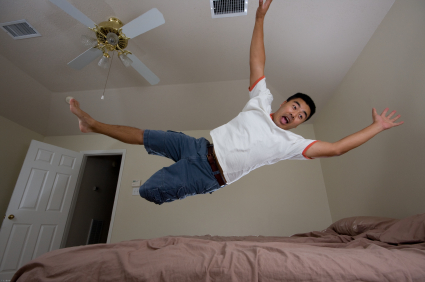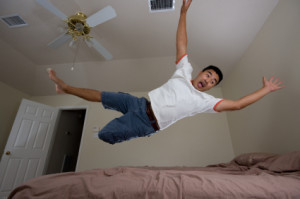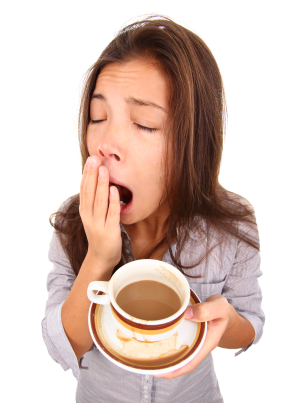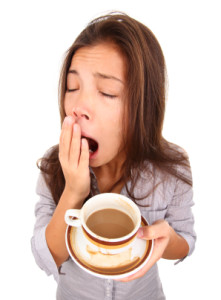You sink into your bed which feels extra warm and cosy. Your weary body thanks you for the sleep it is about to receive and you smile slightly to yourself as you begin to feel all the worries that were whirling round and round your head all day become less meaningful. Dreamy half-formed thoughts and images awash your consciousness as your breathing deepens. You are embracing the glorious state of relaxation that precedes sleep when you are crudely jolted what feels like a foot off your bed as though you just received a few thousand volts. Thanks a lot you hypnic jerk!
Also known as Sleep Starts, the Hypnagogic Massive Jerk, or the Myoclonic Jerk. These twitches occur during the transitional period between wakefulness and sleep that is known as The Hypnagogic state.
Little research has been done on this annoying, yet totally harmless anomoly, but studies suggest as many as 70% of the population have or will experience this at some stage in their life.
The most common hypothesis are:
- The nerves misfiring as our brain changes our muscle tonus causing the muscles to jerk (technically known as Myoclonus) Just like a car undergoing a clumsy gear-change causing it to jolt forward
- An evolutionary explanation is that the spasms are a primal reflex. The brain misinterprets the swift muscle relaxation for falling, causing our brain to alert our muscles to act fast thus jolting us into action.
- One theory suggests the body is reacting to falling asleep in the same way a person may twitch when dying. The hypnic jerk being a reflex used to keep the body functioning.
Auditory and visual sleep starts
An auditory sleep start, also known as Exploding Head Syndrome, is less common than the hypnic jerk. A person hears a loud cracking or snapping sound coming from inside the head as they wake. Also reported are sounds like bomb going off, a gun shot, a doorbell (in my case) or some other indecipherable sound.
The cause is as yet unknown but in this article at Wikipedia some possibilities have been suggested; one is that it may be the result of a sudden movement of a middle ear component or of the eustachian tube, another is that it may be the result of a form of minor seizure in the temporal lobe where the nerve cells for hearing are located. Electroencephalograms recorded during actual attacks show unusual activity only in some sufferers, and have ruled out epileptic seizures as a cause.
A Visual Sleep Start is quite rare. It involves a blinding flash of light that awakens the sleeper. It can be accompanied by an auditory sleep start or can occur on its own.
Prevention
Hypnic Jerks tend to occur when a person is over-tired or is trying hard not to fall asleep. Some sleep experts say stress and fatigue can exacerbate the twitches, while caffeine and alcohol can increase the frequency; so if you are plagued by these spasms avoid them.
Magnesium and Calcium are known for their positive affects on muscles and may help if you are lacking. Dietary sources of magnesium include legumes, whole grains, vegetables (especially broccoli, squash, and green leafy vegetables), seeds, and nuts (especially almonds). Other sources include dairy products, meats, chocolate, and coffee. Water with a high mineral content, or “hard” water, is also a source of magnesium.
Good sources of Calcium include: dark leafy greens such as watercress and kale. Cheese, milk and yoghurt, broccoli, almonds and canned fish.
Get comfortable
People tend to report hypnic jerks occuring when they were not in a comfortable position. Ensure you have a decent mattress and bedding and of course good sleep hygiene and good bedroom ambience go hand-in-hand with trouble-free and good quality sleep.
Do you have experience of the hypnic jerk? If so please tell us how it affects you…




